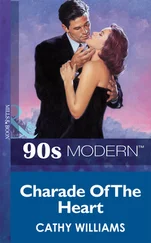Mrs. Mean, too, dumbfounds her opposition. There have been complaints, I understand. Mrs. Mean, herself, has been addressed. The authorities, more than once, have been notified. Nothing has come of it. Well, this is wisdom. Far better to do nothing than act ineptly. Mrs. Mean could out-Christ Pius.
Thus the trumpet sounds. The children scatter. They run to the neighbors, pursued by her stick and her tongue, so she can mow and tamp and water her crop of grass that it may achieve the quiet dignity of lawn. At the distance of oceans and continents, I admire Tanya. I picture her moving lips. I roll the words on my own tongue — the lovely words, so suitable for addressing the world — but they roll silently there, as chaste as any conjunction; whereas Mrs. Mean’s voice utters them with all the sharp, yet exaggerated enunciation of an old Shakespearean. They are volumed by rage and come sudden and strident as panic. Mrs. Mean, moreover, is almost next door and not oceans and continents and languages away.
“Ames. You little snot. Nancy. Witch. Here now. Look where you are now. Look now, will you? God almighty. Move. Get. Oh jesus why do I trouble myself. It’ll die now, little you care. Squashed. That grass ain’t ants. Toll, I warn you. God, god, how did you do that? Why, why, tell me that. Toll, what’s that now? Toll, I warn you now. Pike. Shit. Get. What am I going to do with you? Step on you like that? Squash. Like that? Why try to make it nice? Why? Ames. Damn. Oh damn. You little snot. Wait’ll I get hold of you. Tim. You are so little, Tim. You are so snotty, so dirty snotty, so nasty dirty snotty. Where did you get that? What is that? What’s it now? Drop that. Don’t bring it here. Put it back. Nancy. Witch. Oh jesus, jesus, sweet, sweet jesus. Get. Did you piss in the flowers? Timmy? Timmy, Timmy, Timmy, did you? By god, I’ll beat your bottom flat. Come here. You’re so sweet, so sweet, so nice, so dear. Yes. Come here. All of you. Nancy. Toll. Ames. Tim. Get in here. Now, now I say. Now. Get. I’ll whale you all.”
It is, however, an old play and Mrs. Mean is an old, old player. The recitation, loud as it is, emphatic, fearsome as it is, everyone has heard before. The children almost wholly ignore it. When her voice begins they widen away and start to circle, still at their little vicious games. Mrs. Mean threatens and cajoles but she does not break the rhythm of her weeding. Toll digs with his shovel. “Don’t dig, don’t dig,” Mrs. Mean chants, and Toll digs. “Don’t dig, Toll, don’t dig,” and Toll digs harder. “Didn’t you hear me? didn’t you? Stop now. Don’t dig.” Toll comes red with effort. “I’ll take that shovel. Don’t dig. Toll, you little creeping bastard, did you hear me? I’ll take that shovel. Toll!” The earth is pierced and the turf heaved. Mrs. Mean drops her trowel, rushes upon Nancy, who is nearest, and slams her violently to the ground. Nancy begins screaming. Toll runs. Ames and Timmy widen out and watch. Mrs. Mean cries: “Ah, you little stink — eating mud!” Nancy stops crying and sticks out her muddy tongue; and perhaps this time she learns, although she isn’t very bright, that Mrs. Mean always moves on her real victim silently and prefers, whenever possible, surprise.
Toll and Ames are hard to catch. They keep an eye out. If Mrs. Mean leans on her rake and yells pleasantries at Mrs. Cramm — unfortunate Mrs. Cramm — Toll and Ames push each other from their wagons; but they keep an eye out. The sudden leap of Mrs. Mean across the tulip bed deceives only tiny Tim, his finger in his nose. Mrs. Cramm pales and shrinks and endures it like a slave.
Once I went to a lavish dinner party given by a most particular and most obstinate lady. The maid forgot to serve the beans and my most particular dear friend, rapt in a recollection of her youth that lasted seven courses, overlooked them. I did not nor did the other guests. We were furtive, catching eyes, but we were careful. Was it asparagus or broccoli or brussels sprouts or beans? Was she covering up the maid’s mistake like the coolest actress, as if to make the tipped table and the broken vase a part of every evening’s business? She enjoyed the glory of the long hours of her beauty. The final fork of cake was in her mouth when her jaws snapped. I would have given any sum, then, performed any knavery, to know what it was that led her from gay love and light youth to French-cut green beans and the irrevocable breach of order. She had just said: “We were dancing. I was wearing my most daring gown and I was cold.” She went on a word or two before turning grim and silent. By what Proustian process was the thing accomplished? I suppose it was something matter-of-fact. She shivered — and there in her mind were the missing beans. She rose at once and served them herself, cold, in silver, before the coffee. The hollandaise had doubtless separated so we were spared that. But only that. We ate those beans without a word, though some of us were, on most occasions, loquacious, outspoken, ragging types. Our hostess neglected her own portion and rushed sternly back to glory. Of her sins that evening I never forgave the last.
Mrs. Mean bounds over the tulip bed, her rake falling from her, her great breasts swinging like bells, her string hair rising and whirling, while Mrs. Cramm pretends that Mrs. Mean is calm against the end of her implement and finishes her quiet sentence in her quiet voice and looks straight ahead where her neighbor was as if she were, as good manners demanded, still respectably there. Mrs. Mean roars oaths and passes the time of day. She fails even a gesture of interruption. So Toll and Ames, the older and the wiser ones, keep a good lookout and keep in motion. Mrs. Cramm, however, remains as if staked while Mrs. Mean genially hammers her deeper with rough platitudes and smooth obscenity.
Mrs. Cramm is a frail widow whose shoes are laced. Her misfortune is to live by Mrs. Mean and to be kind. She bestows upon the children, as they flee, the gentlest, tenderest glances. Compassion clothes her, and docility. She flinches for boxed ears. She grimaces at the sight of Mrs. Mean’s stick, but unobtrusively, so much against her will to show the slightest sign that Mrs. Mean, who reads in the world only small words written high, misses it all — the tight hands and nervous mouth and melting eyes. Too stupid to understand, too stupid, therefore, to hate, Mrs. Mean nevertheless plays the tyrant so naturally that her ill will could hardly prove more disagreeable to Mrs. Cramm than her good.
It would almost seem that Mrs. Mean is worse for witnesses. She grows particular. What passed unnoticed before is noted and condemned. The wrestling that was merely damned is suddenly broken by violence. The shrill commands rise to shouts and change to threats. It is as if she wished to impress her company with the depth of her concern, the height of her standards. I knew a girl in college who spent her time, while visiting with you, cleaning herself or the room, if it were hers: lifting lint from her skirt or the hairs of her Persian cat from sofas and chairs; pinching invisible flecks of dirt off the floor, sleeving dust from tables, fingering it from the top edge of mirrors; and it never mattered in the least as far as I could discover whether you came unexpectedly or gave her a week of warning or met her at a play or on the street, she tidied eternally, brushing her blouse with the flickering tips of her fingers, sweeping the surrounding air with a wave of her hand.
It’s early. I’m waiting for the bus when Mrs. Cramm scuttles anxiously from her house carrying a string bag. I prepare to tip my hat and to be gracious for I’ve had little commerce with Mrs. Cramm, and what knowledge that frail lady must possess! Mrs. Mean is then in her doorway crying: “Cramm! It’s a peach of a day, Mrs. Cramm, isn’t it? Come over here!” And Mrs. Cramm, most hesitantly, leaves me. “A peach. Grass is a little thin in back. It’s been too hot for green things. God damn you, Toll, don’t you move. Don’t you move a shitting inch! Here. Scrubbed the kitchen floor. You can’t be too particular. Kids pick up things. Nancy. Be careful. Cut her finger on Dad’s razor. Nancy! Bring your finger. Show Mrs. Cramm your soresore. There. Like to scare us to death.” Mrs. Cramm is murmuring, bending, the wounded finger thrust at her nose. “Bled too,” says Mrs. Mean. “Got on her dress, damn her. How’s your sore-sore now, Nennie? The hell it needs more medicine. Kids, kids. Barely broke the skin. Run and play, go on.” Mrs. Mean pushes the child off. I avert my eyes and turn my back. She stares at me — I feel her face — and her voice drops for an instant. When it rises again it is to curse and to command. “Keep your brother off that floor, my god!” The bus comes into view and I lose all talk in its noise. Mrs. Cramm does not board with me. She takes the next bus, or none, I can only presume.
Читать дальше












